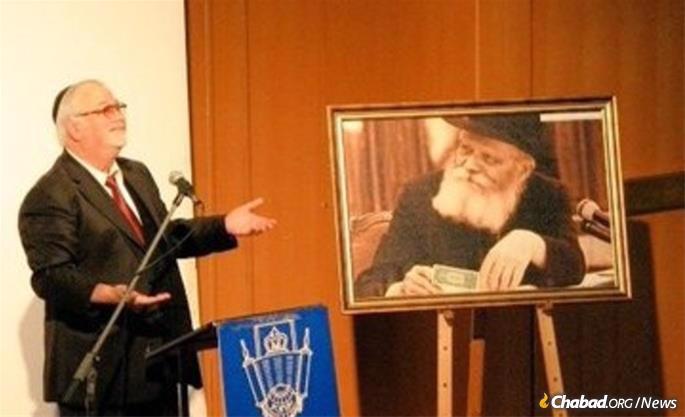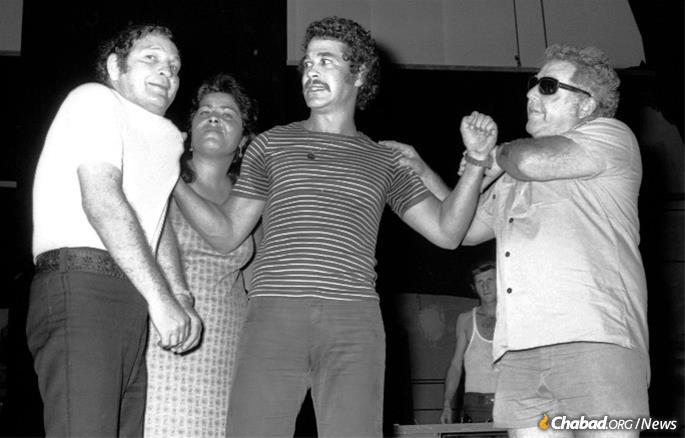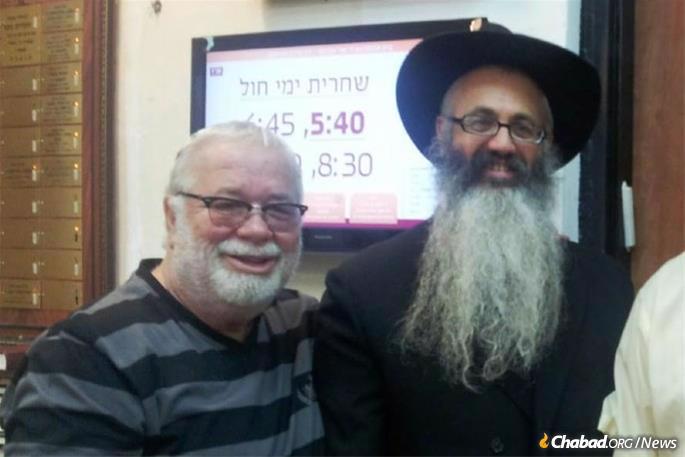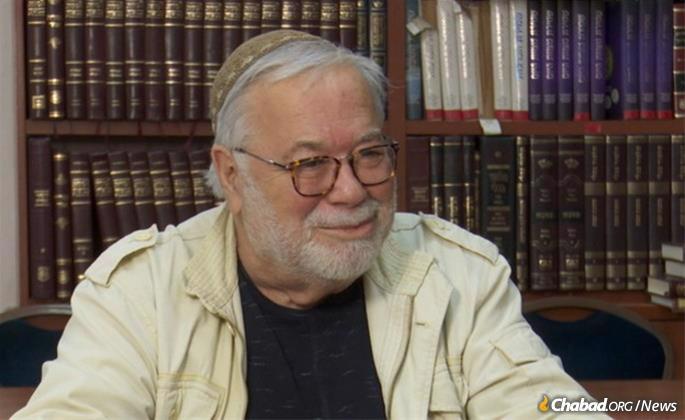Israeli actor and film director Yehuda Barkan, a “wellspring of joy” who embarked on a 35-year spiritual journey rediscovering his Judaism following a brief encounter with the Rebbe—Rabbi Menachem M. Schneerson, of righteous memory—passed away on Oct. 23 from complications resulting from the coronavirus. He was 75 years old.
A gregarious man of oversized charisma, Barkan—born Yehuda Ezekiel Berkowitz in 1945 in Netanya, Israel—was famous for the roles he played in Bourekas films, an outlandish genre of Israeli comic melodramas, primarily in the 1970s, which included cult classics such as “Hagigah BeSnuker” (“Party at the Snooker”), “Lupo!” and “Charlie and a Half,” as well as radio and TV prank shows in the 1980s and ’90s.
Following his embrace of Jewish observance, Barkan would only participate in films of a more modest nature for the last quarter-century of his career. In 2014, he was awarded the Ophir Prize, the Israeli equivalent of the Oscars, for lifetime achievement by the Israeli Academy of Film and Television.
Israeli President Reuven Rivlin eulogized him, saying: “Yehuda Barkan was a wellspring of joy. He was a [cultural] giant and prolific performer, and spiritually he loomed large as well. He was known for his generosity towards all mankind. We will often revisit the legacy he left Israeli culture and recall his vast love and smile.”
Barkan described the beginning of his spiritual journey with his first encounter with the Rebbe in the mid-1980s during a film-related visit to New York. He recalled how when receiving a dollar from the Rebbe, he was captivated by the Rebbe’s holy presence, which he said had a profound effect on him for the rest of his life.
Rabbi Moshe Oirechman, director of Chabad of the Krayot region on the outskirts of Haifa, accompanied Barkan on that visit. The rabbi described how after going by the Rebbe to receive that dollar, Barkan remained standing on the sidelines for almost three hours, transfixed by the personal care and attention that the Rebbe showed to every person who came to receive a dollar and a blessing.

Barkan began to study Judaism on his return to Israel, and his embrace of Judaism progressed in a slow, gradual and steady manner for the rest of his life. Even as he became a role model as a public figure who adopted a religious life, he maintained his many friendships with colleagues in the entertainment industry and retained the admiration of the Israeli public.
Rabbi Sagee Har-Shefer, co-director with his wife, Devora, of Chabad of Nes Ziona and a friend of the actor, told Chabad.org that he explained to Barkan that “in the Rebbe’s view, a person ought not to make radical and unsustainable life changes, completely abandoning their old lifestyle, but rather to progress spiritually in life, each according to his innate abilities and strengths.”
Barkan, he said, took that advice to heart.

A Defining Moment During the Gulf War
When Barkan was asked what the defining moment was that convinced him that he was on the right path in his search for truth, he responded without hesitation that it was during the first Gulf War in 1991.
The winter of 1991 was a terrifying period for Israel, as its citizens were being threatened with chemical warfare in retaliation for a war in which they were not even involved. Gas masks were distributed to all residents, who were instructed to create a sealed room in each home to be used in the event of a gas attack.
Barkan often told people that his sister told him with confidence that the war would be over by Purim, as she had heard that the Rebbe had assured U.S. Army Chaplain Rabbi Jacob Goldstein that there was no need to bring his Megillah scroll to Saudi Arabia, where he was being deployed. Sure enough, with victory at hand, Goldstein was reassigned to Israel shortly before the war ended on Purim day.
Barkan, impressed by the prayers and faith displayed throughout the country as each of the 39 missiles was fired on Israel, could not get over the immensity of what had taken place. “Thirty-nine Scud missiles were fired at Israel by Iraq, and miraculously, no Israelis were directly harmed,” he recalled.
The actor would speak of how his newfound faith helped him through tough times. In the early 1990s, Barkan produced and was heavily invested in a film that flopped at the box office. He went bankrupt, owed a lot of money to loan sharks and was at the lowest point in his career. But after an encounter with children with special needs and a destitute individual who showed up at his door seeking a small donation, Barkan said he suddenly grasped what he was learning about the power of a mitzvah (good deed).
“It dawned on me that although I was not doing so well, I was still in a position to help others who were even less fortunate,” he explained. It was during that period that Barkan began to put on tefillin regularly, which he said gave him faith and a feeling of being connected to his Creator. “If it was not for the Torah during that time in my life, Yehuda Barkan would not be standing here today.”
In the late 1990s, Barkan began attending morning services regularly at Har-Shefer’s Chabad House. He even dedicated a section of the campus to the memory of his late father. When his mother passed away Barkan, usually reserved in displaying his learning, surprised congregants by conveying a lengthy Torah discourse in her memory on the anniversary of her passing.

“Yehuda would attend services at our Chabad House, put on tefillin daily and participate in Torah classes on a regular basis,” said Har-Shefer. “It is perhaps not widely known, but Yehuda was very involved in charity and was always looking to help others. He took it upon himself to light memorial candles for people who died alone and would often cover much of the costs for Chabad House events.”
Oirechman also maintained a close relationship with Barkan through the years, and recalled the actor’s special fondness for the Rebbe.
“Yehuda once invited me to his son’s bar mitzvah in Tel Aviv,” related the rabbi. “I had just returned from a visit to New York, where the Rebbe had given me a bottle of mashke (spirits) on behalf of my outreach activities in the Holy Land. So I brought along the bottle in order to give some l’chaim to the Barkan family as a blessing. When Yehuda heard that the bottle was from the Rebbe, he invited all the guests, including many of the who’s who of Israeli pop culture, over to his table to partake and raise a toast on a glass of the Rebbe’s mashke.”
Har-Shefer recalled that when Barkan sponsored events to mark a special occasion, such as his wife’s recovery from an illness, he insisted that the patrons of the local soup kitchen should be invited to the meal.
Said the rabbi: “He was a living example of ‘a ray of light.’ ”







Start a Discussion